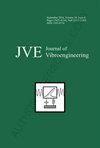Fault diagnosis of rolling bearing based on cross-domain divergence alignment and intra-domain distribution alienation
IF 0.9
Q4 ENGINEERING, MECHANICAL
引用次数: 0
Abstract
When the current transfer learning algorithm is applied to the field of bearing fault diagnosis under different working conditions, it only focuses on reducing the cross-domain distance or the distribution difference within the domain, and does not consider the domain tilt. When the fault samples are scarce, the degradation of recognition ability is more obvious. A fault diagnosis method for rolling bearings based on cross-domain divergence alignment and intra-domain distribution alienation (CDDA-IDDA) is proposed. Firstly, aiming at the cross-domain tilt in the domain data space of variable working conditions, the overall divergence matrix of source domain and target domain is constructed, and the cross-domain divergence alignment is carried out. Then, aiming at the overlapping phenomenon of categories in the domain, based on the distribution adaptation weighted conditional distribution, the spatial distribution of different categories in the same domain is further alienated. Finally, the regularization term is introduced under the framework of structural risk minimization. On the basis of fully retaining the internal structure of the data, a multi-classifier with strong transfer ability is obtained by iteration. Experiments show that the proposed method is better than some mainstream transfer learning algorithms in multi-fault, multi-degree recognition and compound fault diagnosis. In addition, the proposed method still has high diagnostic accuracy when there are few labeled training samples. When the ratio of labeled source domain samples to unlabeled target domain is 1:50 (16 labeled data), the average accuracy of the transfer task reaches 97.78 %.基于跨域发散对准和域内分布异化的滚动轴承故障诊断
目前的迁移学习算法在应用于不同工况下的轴承故障诊断领域时,只关注减少跨域距离或域内分布差异,而没有考虑域倾斜。当故障样本较少时,识别能力的退化更为明显。提出了一种基于跨域发散对齐和域内分布异化(CDDA-IDDA)的滚动轴承故障诊断方法。首先,针对变工况域数据空间中的跨域倾斜问题,构建源域和目标域的总体发散矩阵,进行跨域发散对齐;然后,针对领域内类别重叠现象,基于分布自适应加权条件分布,进一步疏离同一领域内不同类别的空间分布;最后,在结构风险最小化的框架下引入正则化项。在充分保留数据内部结构的基础上,通过迭代得到具有较强传递能力的多分类器。实验表明,该方法在多故障、多程度识别和复合故障诊断等方面优于主流迁移学习算法。此外,在标记训练样本较少的情况下,该方法仍具有较高的诊断准确率。当标记的源域样本与未标记的目标域样本的比例为1:50(16个标记数据)时,传输任务的平均准确率达到97.78%。
本文章由计算机程序翻译,如有差异,请以英文原文为准。
求助全文
约1分钟内获得全文
求助全文
来源期刊

Journal of Vibroengineering
工程技术-工程:机械
CiteScore
1.70
自引率
0.00%
发文量
97
审稿时长
4.5 months
期刊介绍:
Journal of VIBROENGINEERING (JVE) ISSN 1392-8716 is a prestigious peer reviewed International Journal specializing in theoretical and practical aspects of Vibration Engineering. It is indexed in ESCI and other major databases. Published every 1.5 months (8 times yearly), the journal attracts attention from the International Engineering Community.
 求助内容:
求助内容: 应助结果提醒方式:
应助结果提醒方式:


